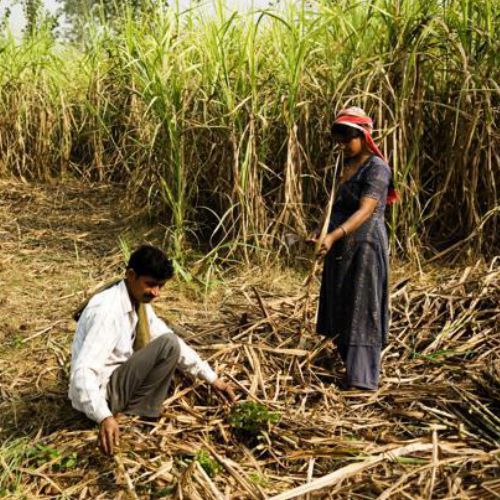On the basis of suggestions and experiences received from cane farmers and various sources and to provide self-employment to rural women entrepreneurs of different cane producing districts at local level and making them self-reliant and to provide income opportunities Commissioner, Cane and Sugar, Sanjay R. Bhoosreddy has issued new guidelines for efficient operation of “Improved cane seed distribution programme scheme by Rural women”.
Giving detailed information in this regards Cane Commissioner told that under improved cane seed distribution programme scheme of rural women, works are included like formation of Women Self Help Groups at the local level. Preparation of nursery of improved varieties of cane through single bud and bud chip method. Increase in sowing of sugarcane by ensuring the distribution of seedlings from the nurseries prepared by these self-help groups and under three-tier cane seed production program, installation of nursery and distribution of seeds etc. have also been included.
He has told that as per the new guidelines, self-help groups would be formed on the basis of “First come First serve” considering the council as a unit.15 to 40 women self-help groups can be formed under a cane council. The number of women members in each self-help group will be minimum 10 and maximum 30. seedlings of any cane varieties approved from the level of Cane Commissioner will be prepared. In view of red rot disease in Lucknow, Ayodhya, Devipatan, Gorakhpur and Deoria regions, seedling of Co.0238 variety will not be prepared under this scheme.
He also informed that cane seedlings produced by women self-help groups would be distributed to local farmers for setting up demonstrations and installation of nursery and general sowing. In the demonstrations to be set up under the National Food Security Mission, sowing of cane will be done by single bud chip and single bud seedling raised by women self-help groups. Arrangements for the training of self-help groups will be made by the concerned Cane Development Council, and if needed, the scientists of the Cane Research Council will also be invited for cooperation. Necessary machines will be made available free of cost to self-help groups on loan/rebate under input credit facility.
Giving information regarding the arrangement and rates of subsidy, Mr. Bhoosreddy said that Sugarcane councils of ‘A’ ‘B’ and ‘C’ category Will be able to bear a subsidy of maximum Rs.60.00 lakh, maximum Rs.40.00 lakh and maximum Rs. Rs.25.00 lakh respectively from their own resources. Under the new guidelines, provision has been made to give subsidy on distribution of maximum five lakh seedlings to any one women self-help group. The subsidy will be paid directly to the respective groups in the account; cash payment will not be allowed. A maximum subsidy of Rs 1.50 per seedling will be payable on the seedling produced by bud chip method and maximum Rs. 1.30 per seedling will be payable on seedling produced by single bud method. Periodic supervision will be done by forming a departmental enforcement team to check the work of the self-help group and for audit of the payment made by the council to the groups and related records.
It is also worth mentioning that “Improved cane seed distribution programme scheme by Rural women” is setting new dimensions of success, for confirmation of this if we look at the data, so far under this scheme 2904 women self-help groups have been formed in 37 sugarcane growing districts of the state and 1450 lakh seedlings have been produced so far through the groups formed by these rural women entrepreneurs.
Due to which they have got an income of about Rs.4350 lakhs and an average of 1.50 lakhs per group per annum. So far 57,680 rural women have been provided self-employment through this scheme and a total employment of 2,52,720 men days has been created. By sowing of seedlings produced by these groups and establishing demonstration of new cane varieties in 5,440 hectare, The area of new varieties of Sugarcane has increased.
Due to the availability of employment options at the village level through this scheme, the morale of rural women entrepreneurs has boosted and the standard of living of this class is improving due to income generation.











